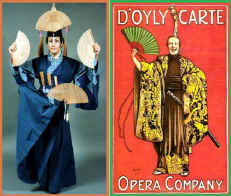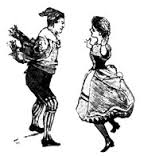

10/2014
D Vautier
 Gilbert & Sullivan music has to be an acquired taste.
The taste doesn’t come right away but it is more gradual
creeping up on you in dreams and
around corners. I first became aware of Gilbert & Sullivan
when I was young and impressionable and in college, when I stumbled
into a committee meeting whose assignment was to modify the G&S Mikado
play for an all male cast. Since
we were an all male religious college it was kind of hard to find
females or even to get men to act like females. Shakespeare did.
Gilbert & Sullivan music has to be an acquired taste.
The taste doesn’t come right away but it is more gradual
creeping up on you in dreams and
around corners. I first became aware of Gilbert & Sullivan
when I was young and impressionable and in college, when I stumbled
into a committee meeting whose assignment was to modify the G&S Mikado
play for an all male cast. Since
we were an all male religious college it was kind of hard to find
females or even to get men to act like females. Shakespeare did.
The play is a love story or more correctly, two love stories, so we had serious logistics problem from the very beginning. We did wiund up using all sorts of strange imagination stretching contrivances. The cast members turned out to be brothers or wards or cousins or nephews or uncles. Three little boys from school sang funny little cute girl songs. The jilted jealous lover became a jilted jealous monk? Amazingly we only had to drop a few very good songs that couldn’t possibly be worked in or worked out, such as Comes a Train of Little Ladies, and the most melodious Braid the Raven Hair but we did leave these melodies in as part of the overture.
 The all-male conversion business reminded me of a joke
my mother once told about a Catholic boys school and a
Catholic girls school across the street from each other. When
the girl’s school got a movie the good nuns edited out all the boys.
When the boys school got the movie the good nuns edited out all
the girls so all you had left were the horses.
The all-male conversion business reminded me of a joke
my mother once told about a Catholic boys school and a
Catholic girls school across the street from each other. When
the girl’s school got a movie the good nuns edited out all the boys.
When the boys school got the movie the good nuns edited out all
the girls so all you had left were the horses.
As it came together we began to put our new well edited all male Mikado into production. I started out (not disguised as a second trombone) but as a male chorus singer and learned the first act, tugging on a rope all the time. Then they suddenly needed a bassoon player so I wound up in the orchestra pit endlessly counting rests. It was not an especially hard part because most of my score consisted of rests anyway. I would rest for 45 measures then play five measures because bassoons and oboes reinforced violins and the violins rule. But I did have a 20-measure part with no rests and my jaw was deformed into a pucker for a long time afterwards. I considered my bassoon part so serious that I took my double reed mouthpiece to bed with me. I would walk into science class looking stupid with a double reed in my mouth. It was absolutely essential that this bassoon player deliver a great performance. I think I did.
As urban legend would have it, there are two double reed instruments in an orchestra, the oboe and bassoon. I am told that the double reed uses head cavities to amplify sound quality. It also has been said that mastering either instrument takes 10 years but after 15 years you go insane and that’s why good oboe players get the highest pay rate because they only have five years to make money before they go insane. Bassoon players take longer.
My Mikado experience left me with a great appreciation of these G&S guys. After my seminary days I became quite familiar with all the other Gilbert & Sullivan plays which had real women performers, and I often wondered why I, or at least the rest of the world for that matter, had never really appreciated these two song composers. I attended plays and watched videos. Even in my sleep I found myself bursting out into G&S song.
| With aspect stern and gloomy stride, We come to learn how you decide. Don’t hesitate your choice to name, A dreadful fate you’ll suffer all the same. Mikado—First Act Finale |
|
Come, friends who plough
the sea. Pirates--With cat-like tread |

One Christmas I got the complete G&S series put on by BBC and went into a self induced G&S binge watch, from which I eventually emerged better for it. But I felt an urge to wear judges’ robes, pirate eye patches, guard uniforms, and Japanese kimonos. My great G&S binge was similar to the summer when I went on a BB (Beethoven Binge) and got naked with just a powdered wig and conductors baton in front of a mirror leading imaginary orchestras.
Gilbert & Sullivan were a team of unsung and forgotten musical heroes who left a unique mark on musical history. Their plays were extremely popular both in England and America. They explore some unusual aspects of human nature and overtly ridicule every and all institutions, particularly the bureaucracy. Their wit is absolutely bone dry, in fact so bone dry that it is lost upon much of contemporary American society who prefer more obvious and less-contrived humor.
 The only
serious play and the best of all is Yeomen of
the Guard because Jack Point dies of a broken heart, having
sold the love of the fair Elsie Maynard.
This same play also arguably contains the best first act finale in my
opinion.
The high point of a typical G&S play is often (“offen”) its first act finale, the second act finale
being more of a recap.
The only
serious play and the best of all is Yeomen of
the Guard because Jack Point dies of a broken heart, having
sold the love of the fair Elsie Maynard.
This same play also arguably contains the best first act finale in my
opinion.
The high point of a typical G&S play is often (“offen”) its first act finale, the second act finale
being more of a recap.
Yeomen also contains one of the best songs they ever did, I Have a Song to Sing, O ! which was very nicely done by Peter, Paul and Mary in 1969.